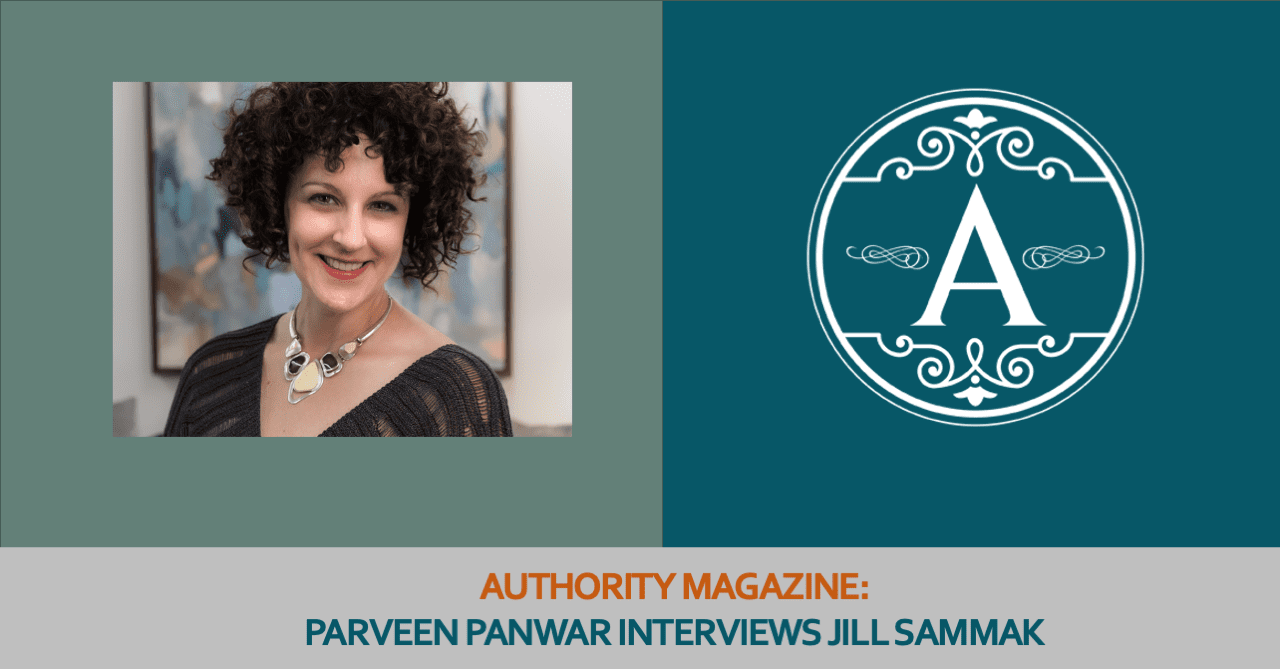You can view the full interview on the Authority Magazine site. Here are some highlights from the conversation.
PP: Thank you so much for joining us! Our readers would love to get to know you a bit better. Can you tell us how you got started?
JS: I had 20 years of business experience when I launched a part-time career as a psychotherapist helping people transform their lives. For eight years, I kept my two professional identities separate. (Picture Clark Kent by day and Superman come nightfall.) Then I realized what a powerful combination it would be to blend them. That’s when I started my third career as a leadership and career coach and founded Jill Sammak Coaching and Consulting, LLC.
PP: What do you think makes your company stand out?
JS: I have a unique trifecta of experience: I worked in corporate settings for over 25 years, so I understand organizational structures and cultures. I am a practicing psychotherapist, so I have deep expertise in human behavior and psychology. And I am a certified professional coach which means I know how to help people find their own answers, so they can achieve lasting change. I honed different skills in each profession.
PP: Can you briefly tell our readers about your experience with managing a team and giving feedback?
JS: I had my first people leadership experience when I was 25. I have been promoted to lead colleagues who were peers. I’ve had direct reports who were older than me, and I became a team leader in an industry where I had no experience. Each of these leadership opportunities had its own unique challenges, but I never let an uncomfortable situation stand in the way of delivering quality feedback in service to developing my team. You can manage a team without giving feedback, but that’s not leadership. Providing feedback is part of enabling your team members’ success.
PP: Can you share with us a few reasons why giving honest and direct feedback is essential to being an effective leader?
JS: Imagine being a parent without giving direct and honest feedback. How about if you were supervising a new medical resident? Do we wonder if coaches should give direct and honest feedback to athletes?
If the system is working correctly, the leader has knowledge and expertise that their team doesn’t have yet. It is their job to share it, so team members can improve. And isn’t it better to do that in a clear and transparent manner instead of obscuring the very information you are trying to convey? It’s the difference between driving with a clear windshield versus a foggy one. Let’s put the defroster on.
PP: One of the trickiest parts of managing a team is giving honest feedback in a way that doesn’t come across as too harsh. Can you please share with us five suggestions about how to best give constructive criticism to a remote employee? Kindly share a story or example for each.
JS: Check in with yourself first: A leader should examine their own emotions since many people are uneasy when they perceive the possibility of conflict. Discomfort can be a barrier to the task at hand. When I work with clients, I ask them how they feel before they have tough conversations. If they are ill at ease, we talk through it, and we identify ways they can get more comfortable.
Be prepared: Don’t wing a conversation as important as this. At a minimum, outline your key talking points. If you are really committed to getting it right, say the words out loud a few times, so your mouth gets comfortable with them.
Give specific examples: Be as specific as possible by using examples. Check the quality of your messaging by asking yourself what you would do differently if you were the recipient of the feedback. Vague feedback is not actionable which means it can do more harm than good. Why you ask? Read on.
It helps if you care: Neurologists know that “criticism inhibits the brain’s ability to learn,” as written by Marcus Buckingham and Ashley Goodall in HBR’s “Why Feedback Fails.” It can help if the employee feels that the leader actually cares about them and their development.
Share what’s in it for them: Many team members are striving for promotions and greater responsibilities. An effective way to couch constructive feedback is to link it to how it serves the employee’s goals: not just the leader’s or the organization.
PP: Can you address how to give constructive feedback over email? How do you prevent the email from sounding too critical or harsh?
JS: I don’t recommend giving constructive feedback via email. Negative feedback can do more harm than good, and written communication is a minefield of miscommunication. Leaders may choose to deliver feedback via email because it is more comfortable for them, and that is never a good enough reason.
If it cannot be avoided, I’d recommend two possible checkpoints:
- Read the email out loud, so you can hear how it sounds to the ear. It is surprising how different things can sound out loud versus in the darkness of our minds.
- Share a draft of the email with a colleague known for their high emotional intelligence and get their feedback. Be sure to protect the identity of the employee, if the person recruited to review the email should not be privy to the information.
PP: In your experience, is there a best time to give feedback or critique? Can you explain what you mean?
JS: I’m going to amend the question slightly and answer not only in regard to critique but also for positive feedback. Be generous. Do it regularly. If you are providing positive feedback, give it soon after the work or behavior you are praising. The act of doing something regularly makes it less scary and progressively more comfortable. Plus, many employees — especially younger employees — prefer regular feedback.
If you are providing developmental feedback, it’s important to get the timing right. Be thoughtful about what the employee has going on in their personal life — if you have any insight — and professional life. For example, do they have a skip level meeting they are feeling stressed about? An hour before would not be a good time to hit them with a critique.
It can be very useful to gauge the employee’s readiness for the conversation by asking them. Avoid setting up the question with anxiety-provoking language. In other words, don’t say: “We need to talk.” Maybe something like this instead, “I’d like to schedule 30 minutes, so we can do a postmortem on yesterday’s presentation. What is a good time for you?”
Finally, make it a common practice to ask your employees to give you feedback each time you deliver a piece of feedback to them. It’s an effective way to signal that you are receptive to their thoughts and opinions, and it helps create reciprocity.
PP: In closing, can you please give us your favorite “Life Lesson Quote”? Can you share how it was relevant to you in your life?
JS: We coaches are focused on helping people find the answers within themselves, so I’ll practice what I preach and share a quote from my four-year old self. My mother told me I used to say, “If you’re going to do it, do it. If you aren’t going to do it, don’t do it.” I’ve lived my life by that quote. I’ve tried to gain a clearer vision of who I am, and what I want, and then take decisive action in the direction of my passions.




